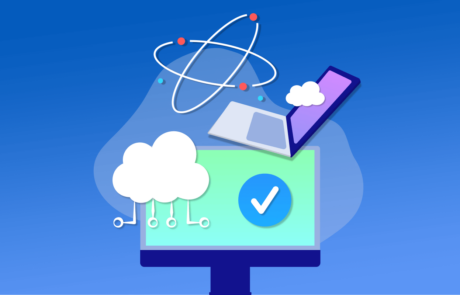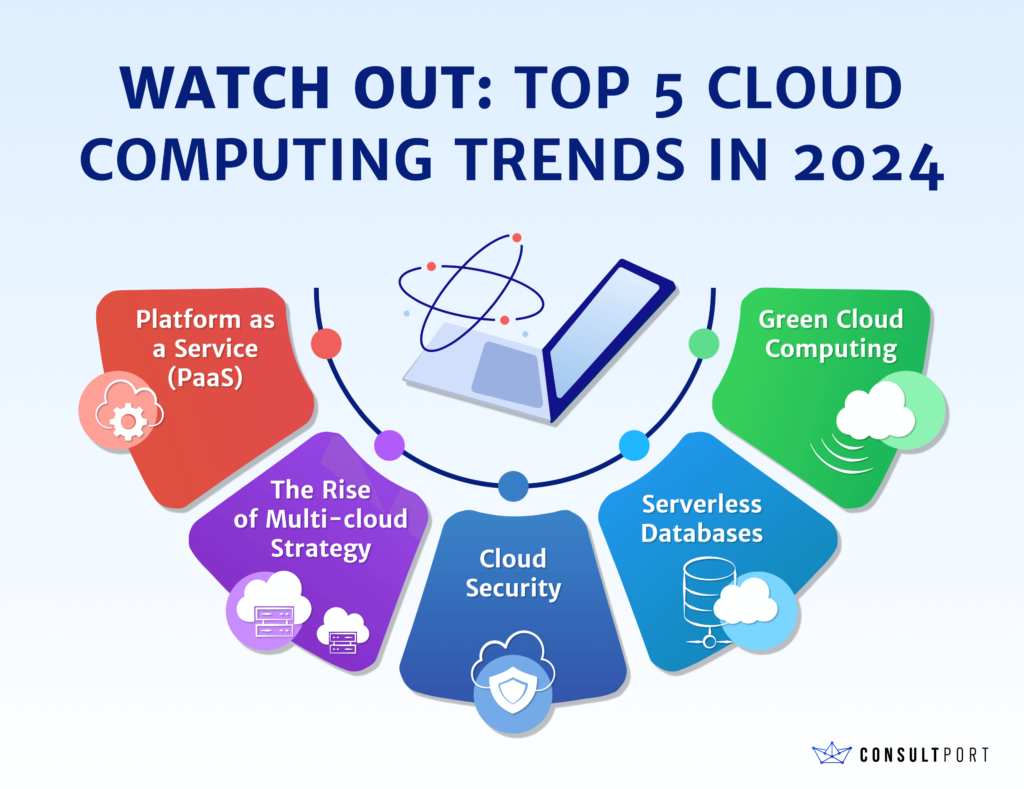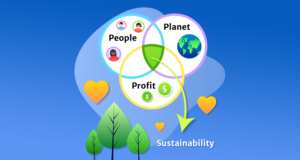Watch Out: Top 5 Cloud Computing Trends in 2024
Blog Categories:
Published:
August 11, 2023
Reading Time:
7 minutes

Nowadays, organizations all over the world are ditching the old-school approach of relying on local hardware and infrastructure. Instead, they've adopted a new shift towards using remote servers hosted by cloud service providers.
With the help of cloud service providers, businesses can access and manage their data and applications anytime from anywhere. This technology has transformed the way we do things, making cloud computing an integral part of modern IT solutions for companies of all sizes, all around the globe. But it’s not as straightforward as it sounds. Even in cloud computing, there are certain trends that are on the rise.
In this article, we’ll discuss the top 5 cloud computing trends that businesses should keep an eye on in the year 2024 and beyond. So, let’s dive into it.
With the help of cloud service providers, businesses can access and manage their data and applications anytime from anywhere. This technology has transformed the way we do things, making cloud computing an integral part of modern IT solutions for companies of all sizes, all around the globe. But it’s not as straightforward as it sounds. Even in cloud computing, there are certain trends that are on the rise.
In this article, we’ll discuss the top 5 cloud computing trends that businesses should keep an eye on in the year 2024 and beyond. So, let’s dive into it.
1. Platform as a Service (PaaS)
This is a growing cloud computing trend you should keep an eye on. Platform as a Service, or PaaS, is a game-changer for developers. If you sign up with a reputed PaaS platform, you can say goodbye to all the hassle of setting up infrastructure and managing servers. This is because the cloud service provider takes care of all that for you.
So, you no longer have to worry about the nitty-gritty details of hardware, networking, or software installation, and this will enable you to focus on more critical tasks. But wait, there’s more. When it's time to deploy your app, PaaS automatically handles scaling and resource management. This ensures that your app performs seamlessly after you release it.
Companies are choosing PaaS for several reasons. First, it makes software development a heck of a lot easier. The comprehensive set of tools, libraries, and frameworks that PaaS provides makes the process of building and deploying software applications far less complicated. The second reason is—you guessed it—cost efficiency! Businesses that want to eliminate upfront costs and ongoing expenses associated with maintaining physical servers are adopting PaaS.
Furthermore, incorporating PaaS can also offer a safe and secure infrastructure for software development as these platforms invest heavily in security measures. Some examples of PaaS include Microsoft Azure, Heroku, AWS Lambda, and Google App Engine.
So, you no longer have to worry about the nitty-gritty details of hardware, networking, or software installation, and this will enable you to focus on more critical tasks. But wait, there’s more. When it's time to deploy your app, PaaS automatically handles scaling and resource management. This ensures that your app performs seamlessly after you release it.
Companies are choosing PaaS for several reasons. First, it makes software development a heck of a lot easier. The comprehensive set of tools, libraries, and frameworks that PaaS provides makes the process of building and deploying software applications far less complicated. The second reason is—you guessed it—cost efficiency! Businesses that want to eliminate upfront costs and ongoing expenses associated with maintaining physical servers are adopting PaaS.
Furthermore, incorporating PaaS can also offer a safe and secure infrastructure for software development as these platforms invest heavily in security measures. Some examples of PaaS include Microsoft Azure, Heroku, AWS Lambda, and Google App Engine.
KEY TAKEAWAYS
- A study claims that more than three-quarters of mid-sized companies have adopted a multi-cloud strategy, and this number is expected to rise to 84% by 2023.
2. The Rise of Multi-cloud Strategy
Now, you may be wondering: What is a multi-cloud strategy? Well, multi-cloud is the tech-savvy practice of using multiple cloud providers for cloud computing services. So, instead of relying on just one provider, organizations can diversify their cloud options in order to benefit from the unique strengths of multiple platforms. This approach can enhance the performance, security, and resilience of the entire cloud computing experience.
Multi-cloud strategies are becoming a cloud computing trend, and are evolving as a hot favorite among mid-sized companies! As of now, more than three-quarters of them have jumped on the multi-cloud bandwagon, a report says. Furthermore, this number is set to skyrocket to a whopping 84% by 2023! It's like there’s a cloud revolution going on these days. Companies are choosing not to put all their eggs in one cloud basket anymore. Instead, they’re exploring multiple cloud providers and choosing the best services each provider has to offer.
Why is this a trend that you should keep in mind? Well, imagine this: you have the speed and flexibility of one cloud provider, and the security and resilience of another cloud provider—it's like making the most of two different platforms!
Multi-cloud strategies are becoming a cloud computing trend, and are evolving as a hot favorite among mid-sized companies! As of now, more than three-quarters of them have jumped on the multi-cloud bandwagon, a report says. Furthermore, this number is set to skyrocket to a whopping 84% by 2023! It's like there’s a cloud revolution going on these days. Companies are choosing not to put all their eggs in one cloud basket anymore. Instead, they’re exploring multiple cloud providers and choosing the best services each provider has to offer.
Why is this a trend that you should keep in mind? Well, imagine this: you have the speed and flexibility of one cloud provider, and the security and resilience of another cloud provider—it's like making the most of two different platforms!
3. Cloud Security
Well, this one is a no-brainer. Since the dawn of civilization, security has always been a major priority of all humans—and cloud security is no different. Because more and more organizations are migrating to the cloud, the protection and privacy of sensitive information has become more important than ever. So, what’s being done to boost security? Let’s discuss.
Strong encryption is a key part of cloud security. In simple terms, encryption makes data unreadable and unusable without the appropriate decryption keys. So, even if a data thief gets into your system uninvited, they won’t be able to cause any real damage. To meet the security needs of their clients, cloud providers are implementing robust encryption techniques to keep data safe.
Multi-factor authentication (MFA) has also become standard practice in many organizations and even this trend isn’t going anywhere in the foreseeable future. By requiring users to provide multiple passwords or one-time codes sent to their email or smartphones, MFA adds an extra layer of security to prevent unauthorized access.
Moreover, Artificial Intelligence (AI) is also playing a huge role in cloud security. By continuously monitoring network traffic, user behavior, and application logs, AI-driven threat detection systems can identify potential threats in real time. This enables organizations to respond to cloud security threats before it’s too late.
And serverless databases are trending for a reason. First and foremost, as you can imagine, they are easy to use. Instead of getting bogged down by database maintenance tasks, developers can spend all their energy on app building. Secondly, organizations looking for scalability are also inclining toward serverless databases. These databases can handle fluctuations in traffic easily by automatically scaling up or down, depending on the demand at any given time.
Furthermore, when companies choose serverless databases, they can enjoy automated maintenance which is handled by the cloud provider itself. This means developers don’t need to get involved in backend maintenance tasks, such as backups and updates. How convenient!
Some popular serverless database providers are as follows: Amazon Aurora, Upstash, Xata, and Fauna.
So, how does ‘green’ cloud computing work? You see, cloud providers are making their operations more sustainable by adopting renewable energy sources, such as solar, wind, and hydroelectric power, to power their data centers. They are reducing their carbon footprint by using efficient server hardware and innovative cooling techniques.
Microsoft has even made its Green Cloud Computing focus public. According to its website, Microsoft's sustainability efforts focus on three areas:
And this is just one example. Small to medium-sized companies are likely to take inspiration from tech giants and do their part in making cloud computing more eco-friendly. That’s why this is the one cloud computing trend that will likely reach its peak in the coming years as other companies learn from the big players.

Strong encryption is a key part of cloud security. In simple terms, encryption makes data unreadable and unusable without the appropriate decryption keys. So, even if a data thief gets into your system uninvited, they won’t be able to cause any real damage. To meet the security needs of their clients, cloud providers are implementing robust encryption techniques to keep data safe.
Multi-factor authentication (MFA) has also become standard practice in many organizations and even this trend isn’t going anywhere in the foreseeable future. By requiring users to provide multiple passwords or one-time codes sent to their email or smartphones, MFA adds an extra layer of security to prevent unauthorized access.
Moreover, Artificial Intelligence (AI) is also playing a huge role in cloud security. By continuously monitoring network traffic, user behavior, and application logs, AI-driven threat detection systems can identify potential threats in real time. This enables organizations to respond to cloud security threats before it’s too late.
4. Serverless Databases
Simply put, serverless databases are a type of database service where the user doesn't have to manage servers. So, instead of worrying about the underlying server resources, capacity planning, or infrastructure management, users can focus on their applications.And serverless databases are trending for a reason. First and foremost, as you can imagine, they are easy to use. Instead of getting bogged down by database maintenance tasks, developers can spend all their energy on app building. Secondly, organizations looking for scalability are also inclining toward serverless databases. These databases can handle fluctuations in traffic easily by automatically scaling up or down, depending on the demand at any given time.
Furthermore, when companies choose serverless databases, they can enjoy automated maintenance which is handled by the cloud provider itself. This means developers don’t need to get involved in backend maintenance tasks, such as backups and updates. How convenient!
Some popular serverless database providers are as follows: Amazon Aurora, Upstash, Xata, and Fauna.
5. Green Cloud Computing
Well, everything ‘eco-friendly’ has been trending for the past few years now, and will likely continue in the following years. Whether it’s packaging material of food products, ingredients of cosmetics, or cloud computing—the need for a greener solution has been a topic of discussion in many industries.So, how does ‘green’ cloud computing work? You see, cloud providers are making their operations more sustainable by adopting renewable energy sources, such as solar, wind, and hydroelectric power, to power their data centers. They are reducing their carbon footprint by using efficient server hardware and innovative cooling techniques.
Microsoft has even made its Green Cloud Computing focus public. According to its website, Microsoft's sustainability efforts focus on three areas:
- Carbon-aware workload scheduling: The tech giant is adopting an advanced optimization framework to schedule workloads efficiently.
- Resource utilization efficiency: Microsoft aims to make the most of existing hardware resources. This will help reduce the need for frequent hardware purchases and save energy during manufacturing.
- Hardware lifespan and recycling: By forecasting hardware failures and putting effective management systems in place, Microsoft aims to extend the lifespan of devices and encourage responsible recycling practices.
And this is just one example. Small to medium-sized companies are likely to take inspiration from tech giants and do their part in making cloud computing more eco-friendly. That’s why this is the one cloud computing trend that will likely reach its peak in the coming years as other companies learn from the big players.

How Cloud Services Consultants Can Help
Do you want to take your company to new heights with the power of cloud services? Well, then Consultport can be your one-stop destination for the best cloud services consultants out there!
We are an online consulting platform that connects businesses with top-notch freelance consultants. We only select the best of the best—all consultants in our network have worked for top consulting firms or blue-chip companies.
Here are the different groups of cloud services consultants we can connect you with:
That’s just a small gist of it. If you want to understand how exactly cloud services consultants can be of assistance to you, get in touch with you now.
We are an online consulting platform that connects businesses with top-notch freelance consultants. We only select the best of the best—all consultants in our network have worked for top consulting firms or blue-chip companies.
Here are the different groups of cloud services consultants we can connect you with:
- Cloud strategy consultants: With their profound industry expertise and years of consulting experience, these consultants can develop a winning cloud strategy for you.
- Cloud migration consultants: Looking for an expert to lead smooth and successful cloud migration? Then you can make the most of your organization's data by hiring these experts.
- Hybrid cloud experts: If you want to use a hybrid mix of public and private cloud platforms, you should hire these experts to help you build the right hybrid cloud strategy. Remember, multi and hybrid cloud strategies are trending!
- Cloud software consultants: By hiring these consultants, you can ensure your company stays ahead with functional, efficient, and up-to-date cloud software solutions.
- Cloud security consultants: These consultants can define, embed, and test technical security protocols and policies for your cloud systems, protecting you from hackers, unauthorized access, and data breaches.
That’s just a small gist of it. If you want to understand how exactly cloud services consultants can be of assistance to you, get in touch with you now.
Share This Story, Choose Your Platform!




